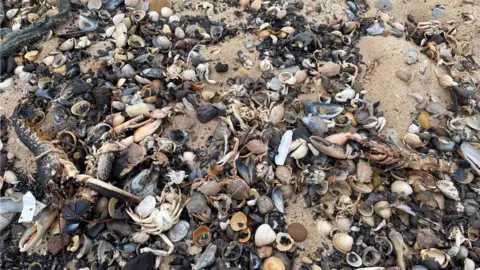Shellfish deaths: Dredging pause would damage Teesside, says MP
 Getty Images
Getty ImagesPausing dredging planned for River Tees developments would damage "jobs and prosperity", an MP has claimed.
Jacob Young, Tory MP for Redcar, says the region cannot afford to halt the work, as academics have requested.
An inquiry into shellfish deaths off the North East coast was told on Tuesday dredging should stop until chemicals in the river bed were mapped.
The government believes the cause of the deaths is naturally occurring algae but fishers say that theory is unsound.
The fishing industry argues an earlier study by Department for Environment, Food and Rural Affairs (Defra) does not provide conclusive evidence.
It commissioned its own report by universities, published last month, which pointed to toxic sediment, possibly disturbed by dredging, as the cause.
That dredging was regular maintenance work which is different to the freeport development, but academics fear what chemicals may be lurking in the sediment.
Mr Young said he could not "further question" Defra's findings.
'Inhibit development'
"I'm not a marine biologist. I take advice from the people that are experts in this field and they've explained what they believe the reasons to be," he said.
"There isn't any certainty in this but all they can do is give their best estimate, based on the science.
"The experts are saying that [dredging] isn't an issue. The idea that we would then allow that to inhibit development on the River Tees would be damaging for Teesside in the long run".
The MP, who is from the area and was elected in 2019, said he was "passionate" about the fishing industry and would "love someone to blame".
 Sally Bunce
Sally Bunce"I don't want to represent a seat where we have crustacean deaths that flood our beach. The local economy suffers, the ecosystem suffers, tourism suffers.
"I want to be in a position where we have sustainable fishing in Redcar but I am also left to the conclusion that this is something that's happened naturally."
The universities' study said the chemical pyridine could have been released by dredging in the Tees and found evidence that it was highly toxic to crabs.
Mr Young described the claims as "a stretch" but conceded that further research would be helpful to "better understand the environment".
He said any new evidence should be studied and evaluated.
Concerns 'being weaponised'
"I'm happy to listen to these theories and I'm happy to put those questions to Cefas [Centre for Environment, Fisheries and Aquaculture], the MMO [Marine Management Organisation], etc. I'm not going to try and present them as fact when I've no evidence to suggest they are."
He said people's concerns about the shellfish die-offs was "being weaponised by people with political agendas" and defended the work of Conservative Tees Valley Mayor Ben Houchen for "the amazing things that we're seeing on Teesside".
Mr Young added: "Some of the top scientists in the country are all saying one thing, and those who may or may not have a political agenda in this are saying something completely contradictory.
"I don't think it's right for us not to have that knowledge in reporting on this issue,"
A spokesperson for South Tees Development Corporation said: "We continue to follow all legal standards and requirements, as is required, including the issued licence and guidance from Defra and the MMO who continue to rule out dredging as a likely cause.
"The Tees Valley Mayor continues to push government for financial support those fishermen whose livelihoods have been affected by this issue."

This article has been amended to clarify the scope of the dredging work.
